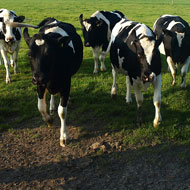bTB incidence falls by 35 per cent in Welsh IAA

Over 95 per cent of herds in Wales are now TB free.
Bovine TB incidence in the intensive action area (IAA) of Wales has fallen by 35 per cent since it was established in 2010, according to a new report.
The IAA was established in North Pembrokeshire as an area where increased measures would be used to tackle the sources of bTB, including stricter cattle controls, improved biosecurity, badger vaccination and testing of all goats and camelids.
Although the approach had not been tried before, figures in the new report show the disease situation is improving more rapidly in the IAA than a nearby comparison area, where TB incidence fell by 23 per cent during the same time period.
The proportion of herds under restriction for bTB in the IAA also fell to 14.3 per cent, from 22.3 per cent in 2010.
Commenting on the report, Welsh cabinet secretary Lesley Griffiths said: “Today’s report is encouraging and shows, over time, all the measures used in the IAA have had a positive impact on the disease. This is further evidence our approach to reducing the incidence of TB is working, with numbers of new incidents now at their lowest in 12 years.”
Over 95 per cent of herds in Wales are now TB free and the proportion of herds with TB has reduced by over a quarter since 2008.
According to the government, the report also underlines the fact that a recent rise in cattle slaughtered due to TB in Wales is not down to a worsening of the disease situation. Instead, this is largely the result of increasing use of the more sensitive gamma interferon blood test and more severe interpretation of the skin test. For the most part the increase is only being seen in areas that carry out the most gamma testing.
Late last year, a consultation was held on the next steps for Wales’ eradication programme. Many of the responses, including a report from a National Assembly committee, agreed that a more regional approach is needed to build on the progress made and accelerate the process of becoming TB free.
Ms Griffiths said she will make a statement on the future of the eradication programme next month.



 RCVS Knowledge has welcomed Professor Peter Cockcroft as editor-in-chief for Veterinary Evidence.
RCVS Knowledge has welcomed Professor Peter Cockcroft as editor-in-chief for Veterinary Evidence.